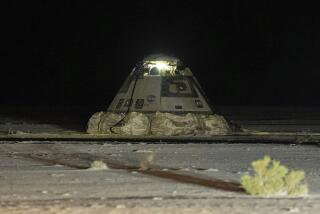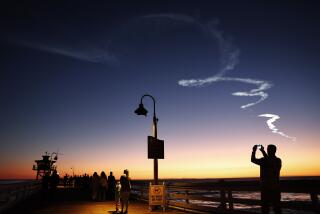Astronauts Return Safely to Smallest Welcome Ever : 27,500 See Touchdown in Desert
- Share via
EDWARDS AIR FORCE BASE — Atlantis’ astronauts glided out of orbit to a safe landing in the Mojave Desert today after a four-day mission that sent a robot spacecraft streaking through the solar system toward Venus.
Commander David Walker guided the 97-ton winged spaceship to a stop on a concrete runway at 12:43 p.m., concluding a flight that covered 1.68 million miles.
“Congratulations and a nice landing, and you’ve extended the shuttle reach far beyond Earth orbit now. Magellan would be proud,” said Mission Control, referring to the 16th-Century Portuguese explorer for whom the Venus spacecraft is named.
About 27,500 spectators--the smallest crowd ever to watch a shuttle landing--were on hand in 90-degree heat. The smallest previous crowd was 35,000, in 1985. An estimated 460,000 people were here for Discovery’s landing March 18, a Saturday, the finale of America’s first shuttle mission since the Challenger disaster.
Braking Rockets
An hour before landing, Walker fired braking rockets 184 miles above the Indian Ocean to drop Atlantis out of orbit and start it on a blazing dive through the atmosphere on a course over the Pacific and across the California coast.
Two sonic booms crackled over the desert as Atlantis swooped powerless through the clear sky, making wide circles as it descended.
As the five astronauts ended the journey, the Magellan probe they released last week was more than 640,000 miles from Earth on a 15-month, 800-million-mile voyage to Venus to map its surface with super-sharp radar.
The Magellan--on the first U.S. interplanetary mission in 11 years--will send back images that scientists said should tell them not only about the history of Venus but also about the evolution of its sister planet, Earth.
Venus, shrouded in sulfuric acid clouds and a carbon dioxide atmosphere, has a runaway “greenhouse effect,” with surface temperatures of 900 degrees.
Similar Overheating Feared
Many scientists fear that Earth may experience similar overheating. “We need to know the mechanisms whereby these things occur,” Thagard said Sunday.
On Sunday, the astronauts stayed up an hour past bedtime to stow equipment after replacing a computer that quit, the only major glitch of the journey.
The problem posed no threat to the flight--the shuttle has four computers, a backup and a spare--but ground controllers decided to take no chances and had the crew cut short their experiments and install a new computer.
The astronauts’ wake-up call this morning consisted of a barking dog and the Beatles’ song “A Hard Day’s Night,” a reference to the repair work the night before.
‘Time to Come Home’
“Good morning. It’s time to come home,” Mission Control communicator Ken Cameron told the crew, whose other members were pilot Ronald Grabe and mission specialists Norman Thagard, Mark Lee and Mary Cleave.
Sunday’s failure occurred in one of four computers that actually fly the shuttle most of the time, but the spacecraft could land with only one computer.
More to Read
Sign up for Essential California
The most important California stories and recommendations in your inbox every morning.
You may occasionally receive promotional content from the Los Angeles Times.













